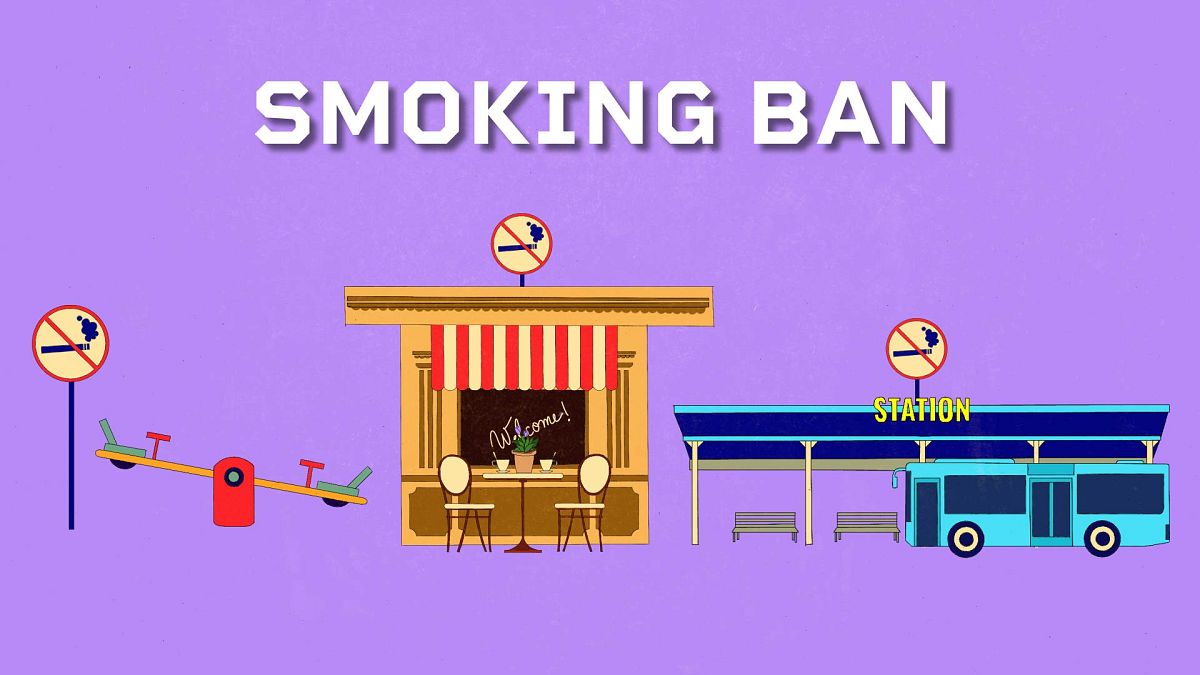EU DECODED: New smoking trends could be affected by more restrictive rules

In this edition, we look at EU Member States’ decision to adopt a recommendation reducing exposure to secondhand smoke in certain outdoor spaces. The aim is to not only ban traditional cigarettes, but also inhaled tobacco products.
Nearly one-third of all cancers are attributed to tobacco use, including exposure to secondhand smoke. The EU’s executive branch made a recommendation, adopted this month by Member States, to reduce exposure to secondhand smoke in some outdoor spaces. However, each of the 27 governments will have full discretion over how to implement it in the next five years.
“There were some Member States that abstained like Czechia, for example, which called for more research into new tobacco products. Other countries already have some of these measures in place, like Sweden, which bans smoking on terraces outside bars and restaurants. In Lithuania, smoking is also limited to strictly designated areas. So now we will have to see what measures each Member State takes”, explained Euronews journalist Marta Iraola, who followed the negotiations.
The new smoking ban would include outdoor areas such as playgrounds and amusement parks, restaurant terraces, rooftops and balconies, public transport stops and areas near health and educational establishments, to name a few examples.
It would no longer be possible to consume traditional tobacco products in these areas, as well as new products such as electronic cigarettes, heated tobacco and herbal vaporization. Europeans interviewed by Euronews in Lisbon and Berlin were divided over the new measures.
“In terms of terraces and social spaces that are not close to health facilities, such as hospitals, I don’t think it makes sense to have a ban”, said a Lisbon resident. “I’m also a smoker, but I think you have a responsibility towards children, for example, and I think it’s good not to smoke on playgrounds”, highlighted a Berlin resident.
This proposal is part of a broader EU plan to combat cancer, presented in 2021 by former Health Commissioner Stella Kyriakides. One of the main goals is to achieve a tobacco-free generation, which means that by 2040, only 5% of the population across Europe would smoke.
How dangerous are new smoking options
The recommendation is not legally binding, but it has given rise to a heated debate in the European Parliament. A resolution failed to pass in plenary on 28 November when the center-right EPP group supported changes made by the ultra-conservative ECR to exclude new tobacco products, such as electronic cigarettes from the recommendation – an amendment slammed by the centre-left, liberals and Greens.
“I’m a doctor, I’m a professor of medicine and for me scientific evidence is of utmost importance. And we supported this change [in the resolution] because, today, two things were missing: an impact study on places, especially on terraces, and then, the relevance of electronic cigarettes. A very recent [medical] congress has just shown that electronic cigarettes help patients to stop smoking”, argued Laurent Castillo, a French MEP from the EPP.
According to the World Health Organization, 90% of lung cancer cases could be prevented by stopping tobacco use. The WHO believes that e-cigarettes that contain nicotine and other toxic substances are also very harmful for the lungs and heart.
Member States receive EU funding through grants of up to €16 million to help them adopt anti-smoking policies, while €80 million is available for nicotine control and addiction prevention.
In 2025, the European Commission is expected to propose new rules on tobacco taxation, advertising and new products – a move likely to upset smokers and their supporters.
Find out more details in the video!
Journalist: Isabel Marques da Silva
Production: Pilar Montero López
Video production: Zacharia Vigneron
Graphics: Loredana Dumitru
Editorial coordination: Ana Lázaro Bosch and Jeremy Fleming-Jones
Source: Euro News














